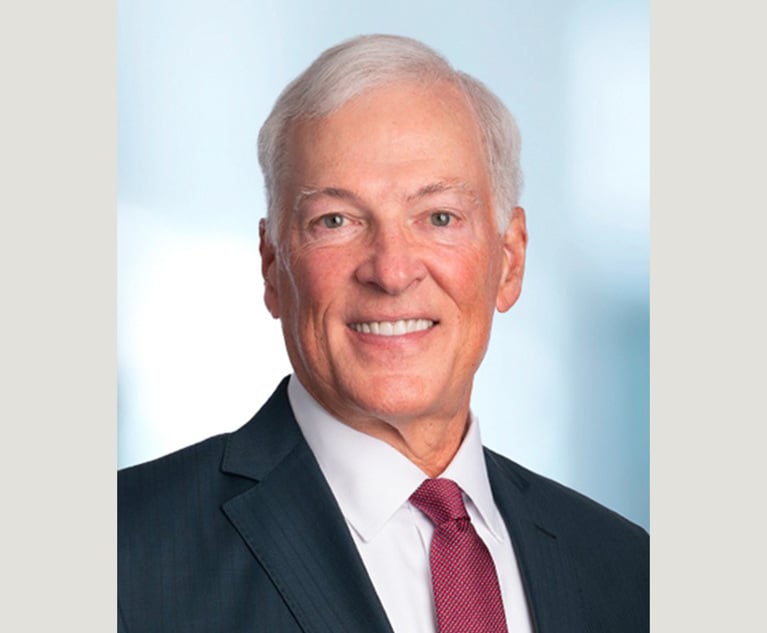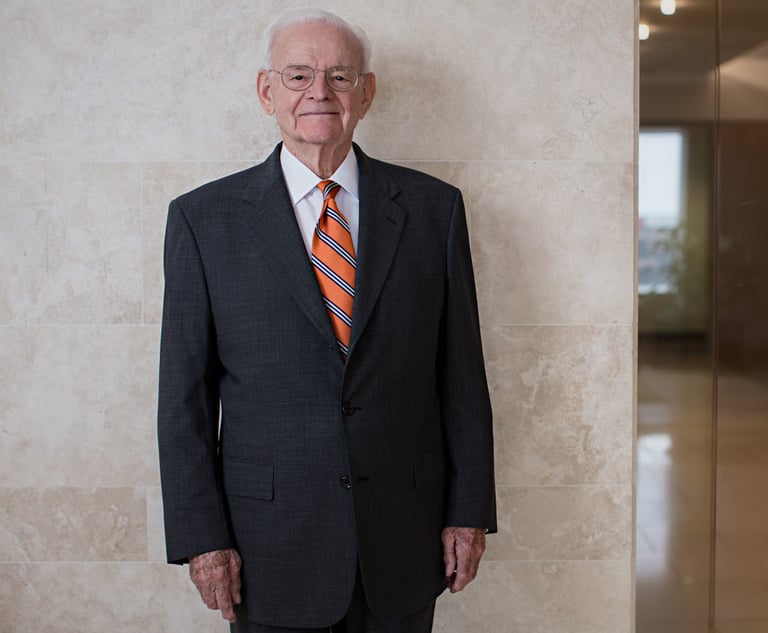Superior Court Candidate Megan Sullivan Discusses Importance of the Separation of Powers
"I believe the courts need to ensure that the emergency powers of the governor and General Assembly do not violate any provisions of the state or federal constitutions. The courts must ensure that individual liberties are not unduly infringed upon," Sullivan said.
October 25, 2021 at 10:49 AM
12 minute read

On Nov. 2, Pennsylvanians are set to decide which candidates will join the ranks of the state Superior Court. To get a better understanding of each candidate's background and judicial philosophy, The Legal has asked each to respond to a questionnaire touching on a variety of topics important to the legal community.
Responses to the questionnaires are set to be published in the weeks leading up to the general election. The second installment comes from attorney Megan Sullivan of Chester County. A former deputy attorney general, Sullivan has been practicing since 2001 and earned her law degree from Temple University's Beasley School of Law. She received a recommended rating from the Philadelphia Bar Association.
The following has been lightly edited for style.
How would you describe your judicial philosophy?
I am hesitant to assign a label to myself, as different people define terms related to judicial philosophy—such as originalist, pragmatist and textualist—in vastly different ways. Instead, I would say that I would interpret the law as written. I believe in the separation of powers that establishes separate and distinct roles for the judicial, executive, and legislative branches of our government so as to create a system of checks and balances. As such, I do not support the trend of judicial activism, legislating from the bench or judges who allow their decisions to be guided by their political beliefs and personal policy preferences. I believe judges should make decisions based upon the law and our state and federal constitutions, as well as the specific set of facts that have been presented to them in a given case.
Judges should approach their cases and decisions with objectivity and impartiality, while also recognizing that it is their responsibility to follow the law.
What two decisions or cases are you most proud of, and why? Conversely, what two opinions or cases would you like to take back or revise if you could, and why?
Two cases that were significant in my career are the following: Commonwealth v. Bresnahan, Court of Common Pleas of Chester County. This was a six-day trial in front of Judge Howard F. Riley that involved over 100 counts of theft and fraud. Mr. Bresnahan was purportedly running a charitable organization that contributed to those in need. Mr. Bresnahan represented himself as a devout Christian to other faith-based charitable organizations. He would solicit donations of necessities like water, diapers and food products from these organizations, and instead of giving them to the needy, he would sell them in order to line his own pockets and financially promote several projects he had in the making.
I inherited this paper intensive case from a prosecutor that had left the Chester County DA's office. It was presented to me as a plea bargain, but it quickly turned into a trial. It was a complex paper case but had several very earnest charities that did great work for the needy. Good charities that helped the indigent, and they were fleeced by the defendant. They appreciated my hard work and concern. It was complex by criminal standards and I had to connect many dots that were not always obvious.
Fisher v. King, Eastern District of Pennsylvania. The Honorable Jeffrey Schmehl granted summary judgment on all claims. This was a complex matter that involved extensive paperwork. It was a Section 1983 case involving allegations of violations of the Fourth Amendment, and I defended the prosecutor in the underlying criminal prosecution. The law was (and I believe still is) unsettled in this specific area regarding an often unused criminal statute that allows for pleas that make victims whole, but does not require the defendant to plead guilty, and allows charges to be dismissed. This case required extensive research and advocacy regarding the Heck doctrine, which precludes a civil lawsuit if the plaintiff pleads guilty to the underlying criminal case.
The underlying criminal case involved an elderly woman whose family "transferred" money she had inherited and distributed the money to her two daughters without the mother/victim's consent. The woman was in her 80s and was reluctant to testify against her daughters and son-in-law. The prosecutor in the case empathized with the victim and came up with a plea bargain that allowed for the money to be transferred back to the victim and avoided the need to testify against her children, which was causing the victim great stress. The prosecutor truly believed that she entered into the plea for all the right reasons. As a former prosecutor, I felt for my client on a personal level, and I know that she truly believed justice was done for all involved. She had the victim's interest at heart, and that is the sign of a caring prosecutor who wants the best result.
I honestly cannot think of a case that I either tried or pled, or settled that I would take back or revise. Although I cannot say with certainty that every single case had the perfect result, any case that I settled or tried required a deliberation process that balanced the likelihood of success with application of justice and fair play. I do know I was always open to the requests of the advocate on the other side and I considered the merits of their perspective as well.
In your view, what makes you the best candidate for the role?
I am a veteran litigator with 20 years of legal experience as both a criminal prosecutor and civil attorney. I have argued cases before both the commonwealth and superior courts, providing me with extensive knowledge and experience that make me well prepared for an appellate court position.
As a prosecutor for more than 12 years, I have been a fierce advocate for victims and the citizens of the commonwealth. During my tenure as a deputy attorney general in the Pennsylvania Attorney General's Office—a position I held from 2017 through early 2021—I prosecuted claims of insurance fraud committed by individuals and corporations in every industry throughout the state. As a deputy attorney general in the civil division, I also represented state employees in civil rights (Section 1983 cases) and employment matters.
I also served for nearly a decade as an assistant district attorney in Chester County. Through my experience in the state attorney general's office and the district attorney's office, I handled all aspects of criminal prosecutions and prosecuted an extensive range of crimes, ranging from child abuse to white collar fraud. I also spent an extensive period of time in the appeals unit at the Chester County DA's office, drafting briefs and arguing appeals before the Superior Court.
Another area that sets me apart from my opponent is that I have approximately eight years of experience in practice as a civil litigator. For three years, I served as assistant general counsel to West Chester University, negotiating contracts, litigating labor arbitrations and advising university departments on federal and state regulatory and higher education laws, as well as other legal matters. I also spent several years in private practice representing businesses, municipalities, and educational institutions in a range of civil litigation. My work included defending the commonwealth and various municipalities on legal matters including employment complaints, civil claims and civil rights matters (§ 1983 cases).
Notably, I am the only candidate for Superior Court who has extensive trial experience in civil and criminal law and has argued extensively before the Pennsylvania Superior Court.
What is the greatest threat to the practice of law or problem the profession faces?
Over the course of my campaign, I have traveled across the state to discuss my campaign with a broad range of Pennsylvanians. In speaking with many of them, they have voiced a concern that the courts have become too political and have lost their objectivity and integrity. There is also a perception that money buys power to the exclusion of justice.
What does your party membership say about you and your legal outlook?
Cases should be decided on statutory law, precedent and the facts/record before an individual court. A judge's party affiliation should say nothing about how they will decide cases that come before them. A judge's political views and personal beliefs should not influence the outcome of their decisions in a particular case.
In light of the recent constitutional amendments approved by voters, what is the courts' role in defining or limiting the emergency powers of the governor and General Assembly?
I believe the courts need to ensure that the emergency powers of the governor and General Assembly do not violate any provisions of the state or federal constitutions. The courts must ensure that individual liberties are not unduly infringed upon. The courts must also ensure that the separation of powers, which seeks to establish a system of checks and balances between the branches of government, are not violated. As such, it is incumbent upon the courts to ensure that the emergency powers of the executive or legislative branches of government do not infringe or detract from the powers reserved and assigned to the other branches.
Do you think courts in Pennsylvania have a perception problem when it comes to appearing partisan? If so, what would you do to combat this?
It is incumbent on all members of the Pennsylvania bar (judges and lawyers) to act ethically in everything they do in their respective practices. Integrity is another must. It would also be helpful for everyone to remember the golden rule: treat others as you wish to be treated. These three very basic principles would go a long way to change the perception of partisanship.
With budgetary threats over the court's computer system and several bills to impeach justices, or reorganize the courts having been drafted over the past few years, the relationship between the General Assembly and the Supreme Court appears to have become strained. Is that a concern, and, if elected to the high court, what would you do about that?
As a candidate for Superior Court, I do not believe it is appropriate to discuss matters related to another court whether substantive or administrative in nature. I also believe I am restrained by the PA Code of Judicial Conduct from responding to this question, as answering this in any way may be perceived as undermining my independence or impartiality as a judge. See PA Code of Judicial Conduct, Canon 4, Rule 4.1 (A)(12).
Did Joe Biden, Josh Shapiro, Stacy Garrity and Tim DeFoor win free, fair and above-board elections in 2020, or do you think the contests were significantly impacted by fraud?
The Code of Judicial Conduct precludes me from providing comment on matters or controversies that may come before me as a judge or may be perceived as undermining my independence or impartiality as a judge. See PA Code of Judicial Conduct, Canon 4, Rule 4.1 (A)(12); see also PA Code of Judicial Conduct, Preamble (2) ("an independent, fair, honorable and impartial judiciary is indispensable to our system of justice. The Pennsylvania legal system is founded upon the principle that an independent, fair, impartial and competent judiciary, composed of persons of integrity, will interpret and apply the law that governs our society.")
What factors matter in deciding when recusal is necessary, and would you recuse yourself if a campaign contributor were involved in litigation as a party or attorney before you?
See the PA Code of Judicial Conduct, Canon 2, Rule 2.11. If elected judge of the Superior Court I would be obligated to follow this rule. I intend to follow this rule if I have the honor and privilege of being elected by the citizens of Pennsylvania.
How important is consensus—particularly unanimous consensus—in appellate court opinions, and are there limits when a judge should only concur, or should they do it any time they feel like it?
The independence of individual jurists is paramount, and they should feel free to concur or dissent when the individual judge believes it is necessary. However, collegiality is a trait necessary for all good judges and lawyers, so I do believe it is important for judges to speak with their colleagues and work to achieve consensus when possible.
How important is stare decisis and when should a court depart from it?
The Superior Court should follow controlling precedent. A case of first impression is another matter entirely. As always, a judge should apply the relevant law to the facts of the case before her. Judges should exercise judicial restraint and follow precedent, not only for the benefit of litigants, but for consistency of the law for all citizens of the commonwealth.
Who are your role models and mentors?
On a personal level my parents are my role models. On a professional level, I have always looked up to the recently deceased Judge Howard F. Riley, a judge on the Chester County Court of Common Pleas. I was in front of him for an extensive period of time, and he taught me so much about objectivity, fairness and integrity. He treated everyone that walked over the threshold of his courtroom with dignity and respect. He never talked down to anyone, but always knew how to simplify legal concepts into simple terms that all people that came before him could understand. He commanded respect, but not through fear. He was a gentleman and a top-notch jurist.
NOT FOR REPRINT
© 2025 ALM Global, LLC, All Rights Reserved. Request academic re-use from www.copyright.com. All other uses, submit a request to [email protected]. For more information visit Asset & Logo Licensing.
You Might Like
View All
Superior Court Directs Western Pa. Judge to Recuse From Case Over Business Ties to Defendant
3 minute read
Saxton & Stump Lands Newly Retired Ex-Chief Judge From Middle District of Pa.
3 minute read
'Discordant Dots': Why Phila. Zantac Judge Rejected Bid for His Recusal
3 minute read
Judge Louis C. Bechtle: An American Jurist Who Relied on Common Sense, Sound Judgment and Fairness
5 minute readTrending Stories
- 1Some Thoughts on What It Takes to Connect With Millennial Jurors
- 2Artificial Wisdom or Automated Folly? Practical Considerations for Arbitration Practitioners to Address the AI Conundrum
- 3The New Global M&A Kings All Have Something in Common
- 4Big Law Aims to Make DEI Less Divisive in Trump's Second Term
- 5Public Notices/Calendars
Who Got The Work
J. Brugh Lower of Gibbons has entered an appearance for industrial equipment supplier Devco Corporation in a pending trademark infringement lawsuit. The suit, accusing the defendant of selling knock-off Graco products, was filed Dec. 18 in New Jersey District Court by Rivkin Radler on behalf of Graco Inc. and Graco Minnesota. The case, assigned to U.S. District Judge Zahid N. Quraishi, is 3:24-cv-11294, Graco Inc. et al v. Devco Corporation.
Who Got The Work
Rebecca Maller-Stein and Kent A. Yalowitz of Arnold & Porter Kaye Scholer have entered their appearances for Hanaco Venture Capital and its executives, Lior Prosor and David Frankel, in a pending securities lawsuit. The action, filed on Dec. 24 in New York Southern District Court by Zell, Aron & Co. on behalf of Goldeneye Advisors, accuses the defendants of negligently and fraudulently managing the plaintiff's $1 million investment. The case, assigned to U.S. District Judge Vernon S. Broderick, is 1:24-cv-09918, Goldeneye Advisors, LLC v. Hanaco Venture Capital, Ltd. et al.
Who Got The Work
Attorneys from A&O Shearman has stepped in as defense counsel for Toronto-Dominion Bank and other defendants in a pending securities class action. The suit, filed Dec. 11 in New York Southern District Court by Bleichmar Fonti & Auld, accuses the defendants of concealing the bank's 'pervasive' deficiencies in regards to its compliance with the Bank Secrecy Act and the quality of its anti-money laundering controls. The case, assigned to U.S. District Judge Arun Subramanian, is 1:24-cv-09445, Gonzalez v. The Toronto-Dominion Bank et al.
Who Got The Work
Crown Castle International, a Pennsylvania company providing shared communications infrastructure, has turned to Luke D. Wolf of Gordon Rees Scully Mansukhani to fend off a pending breach-of-contract lawsuit. The court action, filed Nov. 25 in Michigan Eastern District Court by Hooper Hathaway PC on behalf of The Town Residences LLC, accuses Crown Castle of failing to transfer approximately $30,000 in utility payments from T-Mobile in breach of a roof-top lease and assignment agreement. The case, assigned to U.S. District Judge Susan K. Declercq, is 2:24-cv-13131, The Town Residences LLC v. T-Mobile US, Inc. et al.
Who Got The Work
Wilfred P. Coronato and Daniel M. Schwartz of McCarter & English have stepped in as defense counsel to Electrolux Home Products Inc. in a pending product liability lawsuit. The court action, filed Nov. 26 in New York Eastern District Court by Poulos Lopiccolo PC and Nagel Rice LLP on behalf of David Stern, alleges that the defendant's refrigerators’ drawers and shelving repeatedly break and fall apart within months after purchase. The case, assigned to U.S. District Judge Joan M. Azrack, is 2:24-cv-08204, Stern v. Electrolux Home Products, Inc.
Featured Firms
Law Offices of Gary Martin Hays & Associates, P.C.
(470) 294-1674
Law Offices of Mark E. Salomone
(857) 444-6468
Smith & Hassler
(713) 739-1250





